Impact of State/Territory Legislation on Workplace Regulations and Duties
Added on 2023-04-05
24 Pages5802 Words435 Views
HLTWHS004
MANAGE WORK HEALTH AND SAFETY
ASSESSMENT
DIPLOMA OF COMMUNITY SERVICES
Student’s Name
Date-
MANAGE WORK HEALTH AND SAFETY
ASSESSMENT
DIPLOMA OF COMMUNITY SERVICES
Student’s Name
Date-
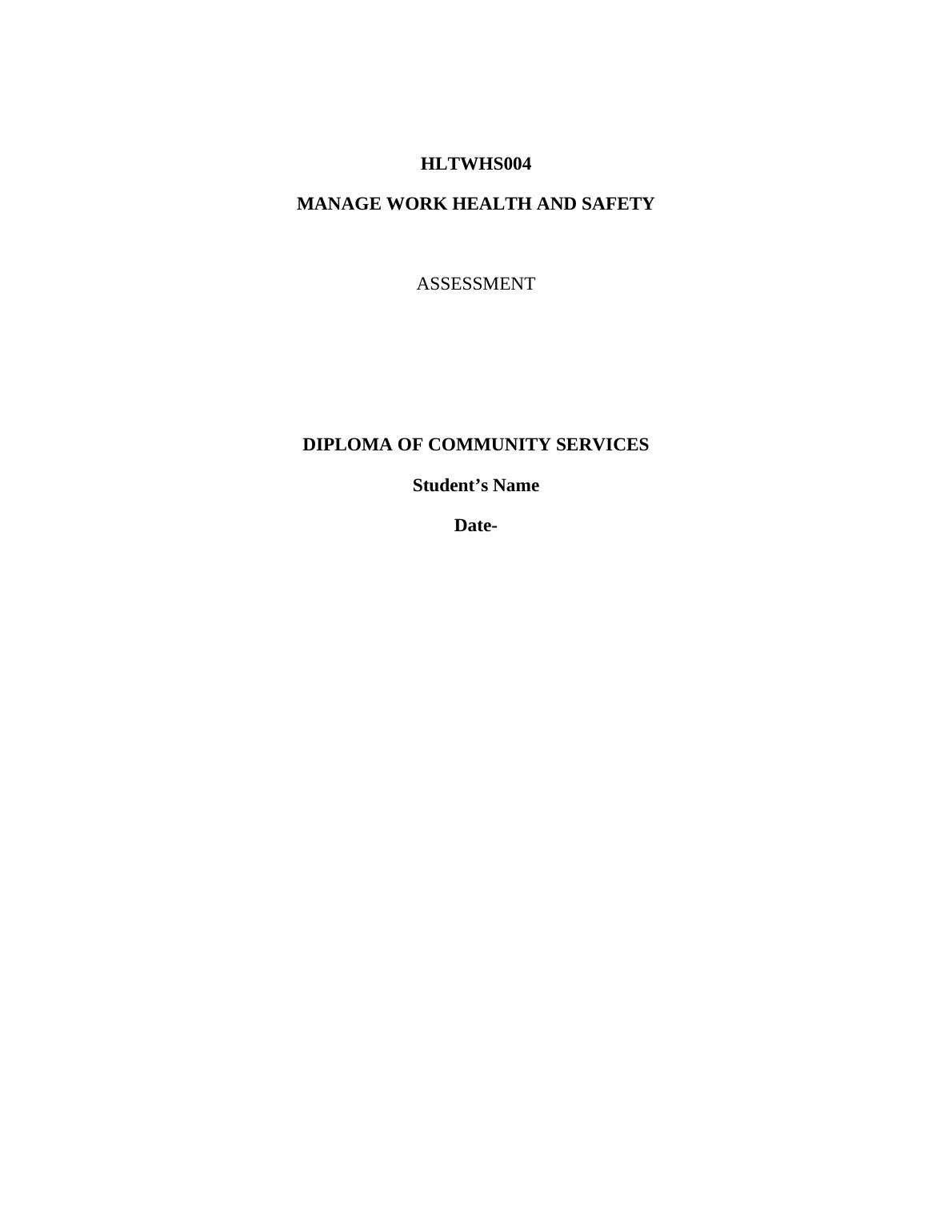
Final assessment tasks
Part A – Questions
Question 1 Explain how state/territory legislation impacts workplace regulations,
codes of practice and industry standards, including WHS authorities.
Answer In year 2011, safe work Australia developed a set of WHS laws and
the same is applicable through Australia (except Victoria and
Western Australia). In such a manner, every organization now needs
to implement this standard set of law. Nevertheless, In Australia,
different states and territories have their separate acts on the subject
of workplace health and safety. This is the reason that different
organizations and industries follow different legislations. The same
can be understood by an example. For instance, in addition to the
model WHS laws, the employer in Victoria state also need to comply
with occupational health and safety act 2004 (Business.gov.au,
2018). Further Work Health and Safety Act 2011 (Qld) is applicable
throughout Queensland. If to talk about the legislations of territory,
Occupational health, safety and welfare Act 1986 (South Australia),
Occupational safety and health Act 1984 (Western Australia) and
many others are there which define different obligations for the
employers.
Although the final objectives of all these legislations are the same yet
the requirements are different. Businesses need to develop their code
of practice and policies according to these legislations. In addition to
this, sometimes these legislations are industry-specific due to which
various industries have different standards.
Marking q Satisfactory q Unsatisfactory
Question 2 Explain how state/territory legislation impacts the rights and
responsibilities of persons conducting a business or undertaking
(PCBUs), officers and workers, including the duty of care.
Answer There are many acts that defines the entitlements and responsibilities
of the employer and employee. Sometimes, these legislations are
closely connected to the health and safety of workers. These
Legislations put liability on the employer to provide a safe and secure
Part A – Questions
Question 1 Explain how state/territory legislation impacts workplace regulations,
codes of practice and industry standards, including WHS authorities.
Answer In year 2011, safe work Australia developed a set of WHS laws and
the same is applicable through Australia (except Victoria and
Western Australia). In such a manner, every organization now needs
to implement this standard set of law. Nevertheless, In Australia,
different states and territories have their separate acts on the subject
of workplace health and safety. This is the reason that different
organizations and industries follow different legislations. The same
can be understood by an example. For instance, in addition to the
model WHS laws, the employer in Victoria state also need to comply
with occupational health and safety act 2004 (Business.gov.au,
2018). Further Work Health and Safety Act 2011 (Qld) is applicable
throughout Queensland. If to talk about the legislations of territory,
Occupational health, safety and welfare Act 1986 (South Australia),
Occupational safety and health Act 1984 (Western Australia) and
many others are there which define different obligations for the
employers.
Although the final objectives of all these legislations are the same yet
the requirements are different. Businesses need to develop their code
of practice and policies according to these legislations. In addition to
this, sometimes these legislations are industry-specific due to which
various industries have different standards.
Marking q Satisfactory q Unsatisfactory
Question 2 Explain how state/territory legislation impacts the rights and
responsibilities of persons conducting a business or undertaking
(PCBUs), officers and workers, including the duty of care.
Answer There are many acts that defines the entitlements and responsibilities
of the employer and employee. Sometimes, these legislations are
closely connected to the health and safety of workers. These
Legislations put liability on the employer to provide a safe and secure
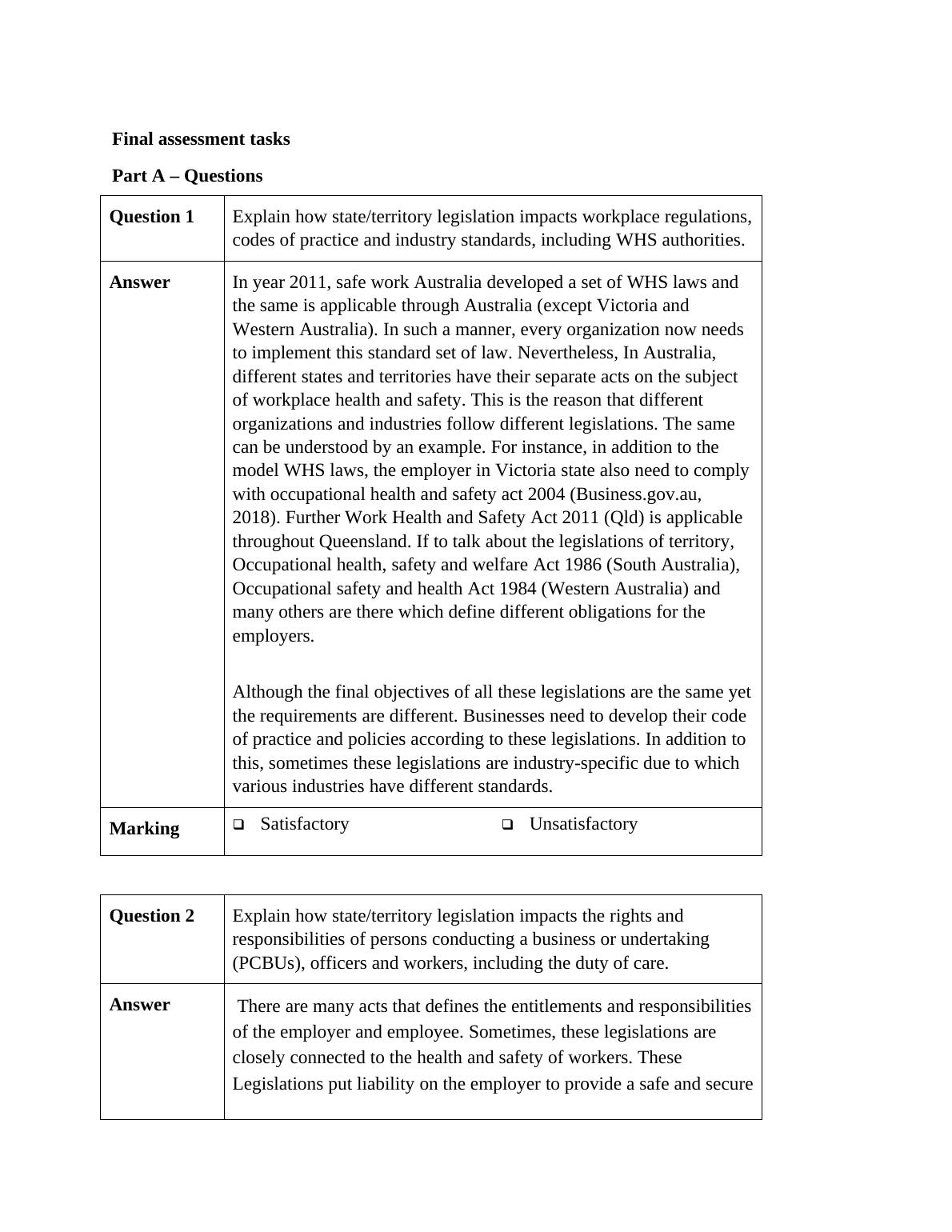
workplace to workers. For instance Electrical Safety Act 2002 is
there which requires a person who is conducting business or
undertaking (PCBUs) is required to ensure that the business is a
conducting in a way that is electrically safe (Worksafe.qld.gov.au,
2019). Further, The Work Health and Safety (WHS) laws also put
liability on persons conducting a business or undertaking (PCBUs).
According to these laws, every such person is required to provide a
safe system of work, safe plant, structure and other supports.
In addition to this, officers, workers, and other persons are also
covered by state legislations. For instance Work Health and Safety
Act 2011 (Qld) prescribe the duty of officers that the need to ensure
in respect of workplace health and safety. The act is applicable
throughout Queensland. This act also states that every officer of the
organization should exercise due diligence in order to ensure the
existence of a safe and healthy workplace. Duties are not there only
for employers, but workers also have a responsibility to take
reasonable care for theirs and other’s safety. In such a manner
territory acts influence impacts the responsibilities and rights of
various parties.
Marking q Satisfactory q Unsatisfactory
Question 3 Explain how state/territory legislation impacts due diligence
requirements.
Answer As mentioned in the above-mentioned part, Work Health and Safety
Act 2011 (WHS Act) states the due diligence requirements, the same
are further detailed in this part. This act prescribes a specific duty for
an officer of corporations and unincorporated bodies. These
unincorporated bodies include club and associations. According to
the subjective duty, such officers are required to keep ensuring that
organizations are fulfilling their duty to provide a healthy and safe
work environment to their workers. In the process of due diligence,
these officers have a responsibility to show that they have taken all
the sensible steps to obtain knowledge related to safety and health
matters. In addition to these, they also need to show that they have
tried their best to ensure that PCUBs complying the requirements
there which requires a person who is conducting business or
undertaking (PCBUs) is required to ensure that the business is a
conducting in a way that is electrically safe (Worksafe.qld.gov.au,
2019). Further, The Work Health and Safety (WHS) laws also put
liability on persons conducting a business or undertaking (PCBUs).
According to these laws, every such person is required to provide a
safe system of work, safe plant, structure and other supports.
In addition to this, officers, workers, and other persons are also
covered by state legislations. For instance Work Health and Safety
Act 2011 (Qld) prescribe the duty of officers that the need to ensure
in respect of workplace health and safety. The act is applicable
throughout Queensland. This act also states that every officer of the
organization should exercise due diligence in order to ensure the
existence of a safe and healthy workplace. Duties are not there only
for employers, but workers also have a responsibility to take
reasonable care for theirs and other’s safety. In such a manner
territory acts influence impacts the responsibilities and rights of
various parties.
Marking q Satisfactory q Unsatisfactory
Question 3 Explain how state/territory legislation impacts due diligence
requirements.
Answer As mentioned in the above-mentioned part, Work Health and Safety
Act 2011 (WHS Act) states the due diligence requirements, the same
are further detailed in this part. This act prescribes a specific duty for
an officer of corporations and unincorporated bodies. These
unincorporated bodies include club and associations. According to
the subjective duty, such officers are required to keep ensuring that
organizations are fulfilling their duty to provide a healthy and safe
work environment to their workers. In the process of due diligence,
these officers have a responsibility to show that they have taken all
the sensible steps to obtain knowledge related to safety and health
matters. In addition to these, they also need to show that they have
tried their best to ensure that PCUBs complying the requirements
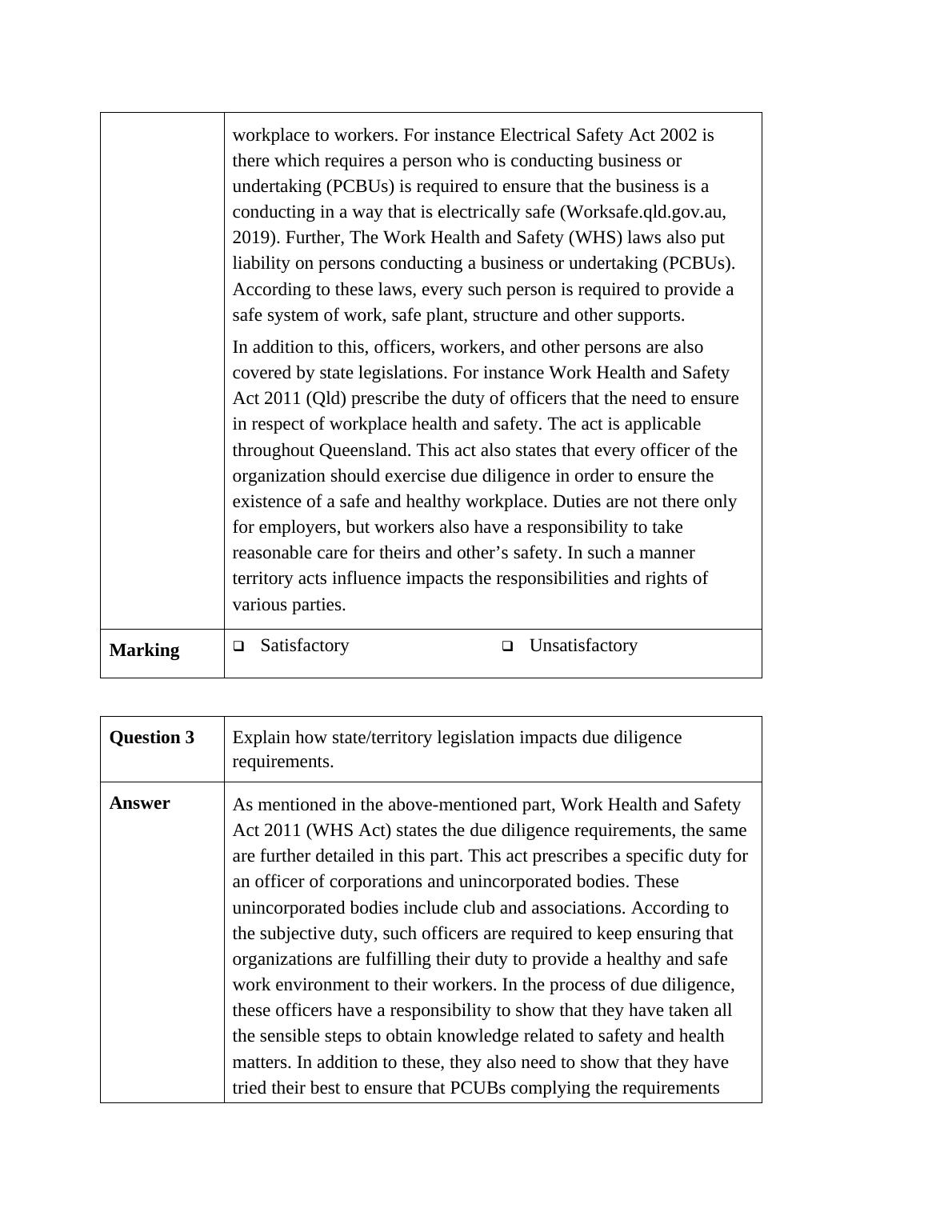
mentioned under the WHS Act.
The act does not only prescribe the duty of due diligence for officers
but also outlined the manner in which the due diligence can be
conducted. Trained safety advisors are another concept of due
diligence policy, according to which every government departments,
statutory authorities, and government-owned companies are required
to retain trained safety advisors in order to meet the due diligence
requirements. After the above-mentioned discussion, this would not
be wrongful to state that state legislations have an impact on the
requirement and process of due diligence.
Marking q Satisfactory q Unsatisfactory
Question 4 Explain how state/territory legislation impacts general duty
requirements.
Answer Before moving ahead to the discussion of legislations, first, the
meaning of general duties is required to be understood. In order to
answer this is to state that general duties refer to the duties of an
employer which is not prescribed under any legislation and yet,
employers/person conducting business needs to perform them.
Further, many legislations are there which affect such duties.
Occupational health, safety and welfare Act 1986 is the legislation in
South Australia. The legislation leads a general duty to the employer
to provide a, safe working environment, safe plants, safe system of
work, and substances and to keep training related documents. In
Victoria, Occupational Health and Safety Act 2004 is there which
establish many general duties on employer such as to ensure that
other people are not exposing any risk from their entity (CCH
Australia Limited, 2010).
In Western Australia, Occupational safety and health Act 1984 is
there. Section 21 of this act mentions the general duty of care to
employers regarding people at the workplace (other than the
employees). These are the territory legislations which prescribe
general duties for the employers. After reviewing the above-
mentioned provisions it is clear that state, as well as territory
The act does not only prescribe the duty of due diligence for officers
but also outlined the manner in which the due diligence can be
conducted. Trained safety advisors are another concept of due
diligence policy, according to which every government departments,
statutory authorities, and government-owned companies are required
to retain trained safety advisors in order to meet the due diligence
requirements. After the above-mentioned discussion, this would not
be wrongful to state that state legislations have an impact on the
requirement and process of due diligence.
Marking q Satisfactory q Unsatisfactory
Question 4 Explain how state/territory legislation impacts general duty
requirements.
Answer Before moving ahead to the discussion of legislations, first, the
meaning of general duties is required to be understood. In order to
answer this is to state that general duties refer to the duties of an
employer which is not prescribed under any legislation and yet,
employers/person conducting business needs to perform them.
Further, many legislations are there which affect such duties.
Occupational health, safety and welfare Act 1986 is the legislation in
South Australia. The legislation leads a general duty to the employer
to provide a, safe working environment, safe plants, safe system of
work, and substances and to keep training related documents. In
Victoria, Occupational Health and Safety Act 2004 is there which
establish many general duties on employer such as to ensure that
other people are not exposing any risk from their entity (CCH
Australia Limited, 2010).
In Western Australia, Occupational safety and health Act 1984 is
there. Section 21 of this act mentions the general duty of care to
employers regarding people at the workplace (other than the
employees). These are the territory legislations which prescribe
general duties for the employers. After reviewing the above-
mentioned provisions it is clear that state, as well as territory
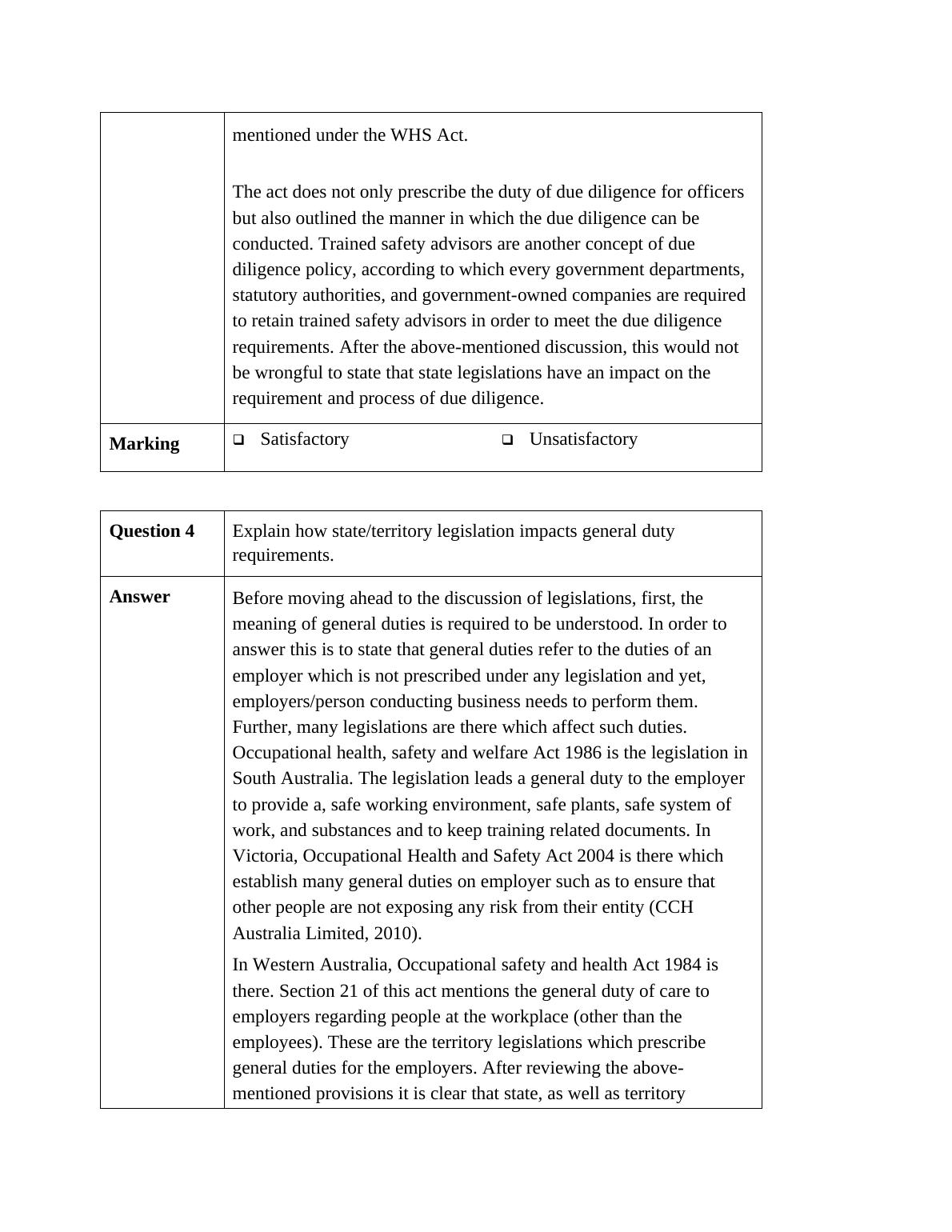
legislations, influences the general duty requirements and employers
of that particular state, as well as territory, need to follow them.
Marking q Satisfactory q Unsatisfactory
Question 5 Provide two examples of regulatory requirements that relate to the
community services work environment.
Answer The Work Health and Safety Act 2011 is a first key regulatory
requirement that provides provisions regarding the health and safety
of community services work environment. A primary duty of care is
imposed through this act to ensure that community workers remain
safe when they visit the community services work environment.
Various general duties are also imposed on parties to make sure that
they take sensible steps to ensure the safety and health of community
workers (Macdonald, Driscoll, Stuckey & Oakman, 2012). These
duties include providing and maintaining the work environment and
the relevant system to avoid potential health risks. Another duty is
appropriate handling and use of storage, transportation, and
substances which could pose a safety threat for community workers.
Providing information and instructions regarding the use of
equipment and monitoring the conditions to control and prevent
injury or illness.
The Occupational Health and Safety Act 2004 (Vic) is another key
act which provides regulatory requirements regarding maintenance of
a healthy and safe working environment to protect community
workers (Chan-Mok, Caponecchia & Winder, 2014). Various
guidelines are given in this act which parties have to comply to
ensure that they evaluate potential risks which could injure or harm
community workers.
Marking q Satisfactory q Unsatisfactory
Question 6 Explain WHS policy requirements regarding designated person/s for
raising issues.
of that particular state, as well as territory, need to follow them.
Marking q Satisfactory q Unsatisfactory
Question 5 Provide two examples of regulatory requirements that relate to the
community services work environment.
Answer The Work Health and Safety Act 2011 is a first key regulatory
requirement that provides provisions regarding the health and safety
of community services work environment. A primary duty of care is
imposed through this act to ensure that community workers remain
safe when they visit the community services work environment.
Various general duties are also imposed on parties to make sure that
they take sensible steps to ensure the safety and health of community
workers (Macdonald, Driscoll, Stuckey & Oakman, 2012). These
duties include providing and maintaining the work environment and
the relevant system to avoid potential health risks. Another duty is
appropriate handling and use of storage, transportation, and
substances which could pose a safety threat for community workers.
Providing information and instructions regarding the use of
equipment and monitoring the conditions to control and prevent
injury or illness.
The Occupational Health and Safety Act 2004 (Vic) is another key
act which provides regulatory requirements regarding maintenance of
a healthy and safe working environment to protect community
workers (Chan-Mok, Caponecchia & Winder, 2014). Various
guidelines are given in this act which parties have to comply to
ensure that they evaluate potential risks which could injure or harm
community workers.
Marking q Satisfactory q Unsatisfactory
Question 6 Explain WHS policy requirements regarding designated person/s for
raising issues.
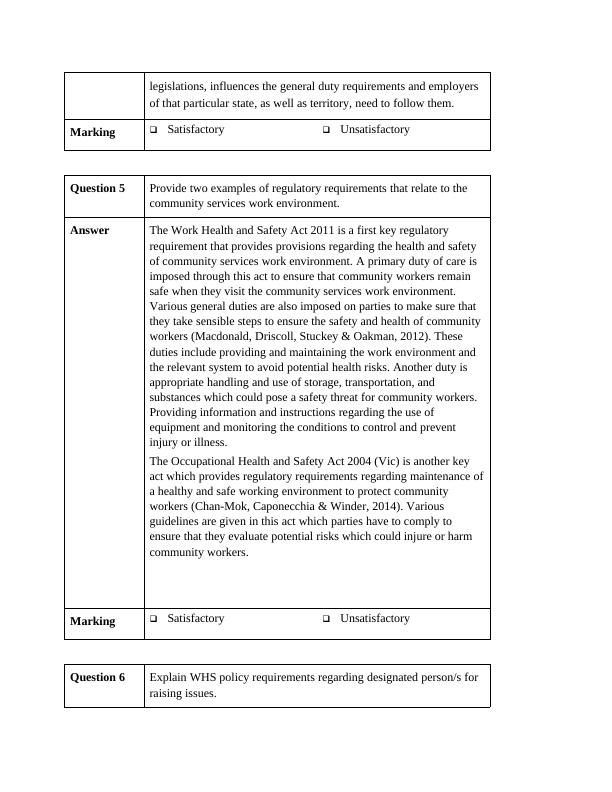
Answer WHS policy of every organization will clearly state the role and
responsibility of each party. In addition to this, the same will also
state the name of the designated person to whom the issues will be
expected to raise. In general, such a person is the supervisor of the
employee. According to the provisions of Work Health and Safety
Act 2011, a worker can raise the issues related to health and safety to
his/her employer/ person conducting business, an inspector, A WHS
entry permit holder, health and safety representative, any member of
health and safety committee or any other person who has duty to deal
with such matter under the act.
Until unless the workers will not be aware of the authority, they are
not supposed to raise their concern by a decided channel. This is the
reason that every organization is required to state the information of
the designated person in the WHS policy. In addition to this, the act
also prescribes the eligibility and manner of becoming a Health and
safety representative.
Marking q Satisfactory q Unsatisfactory
responsibility of each party. In addition to this, the same will also
state the name of the designated person to whom the issues will be
expected to raise. In general, such a person is the supervisor of the
employee. According to the provisions of Work Health and Safety
Act 2011, a worker can raise the issues related to health and safety to
his/her employer/ person conducting business, an inspector, A WHS
entry permit holder, health and safety representative, any member of
health and safety committee or any other person who has duty to deal
with such matter under the act.
Until unless the workers will not be aware of the authority, they are
not supposed to raise their concern by a decided channel. This is the
reason that every organization is required to state the information of
the designated person in the WHS policy. In addition to this, the act
also prescribes the eligibility and manner of becoming a Health and
safety representative.
Marking q Satisfactory q Unsatisfactory
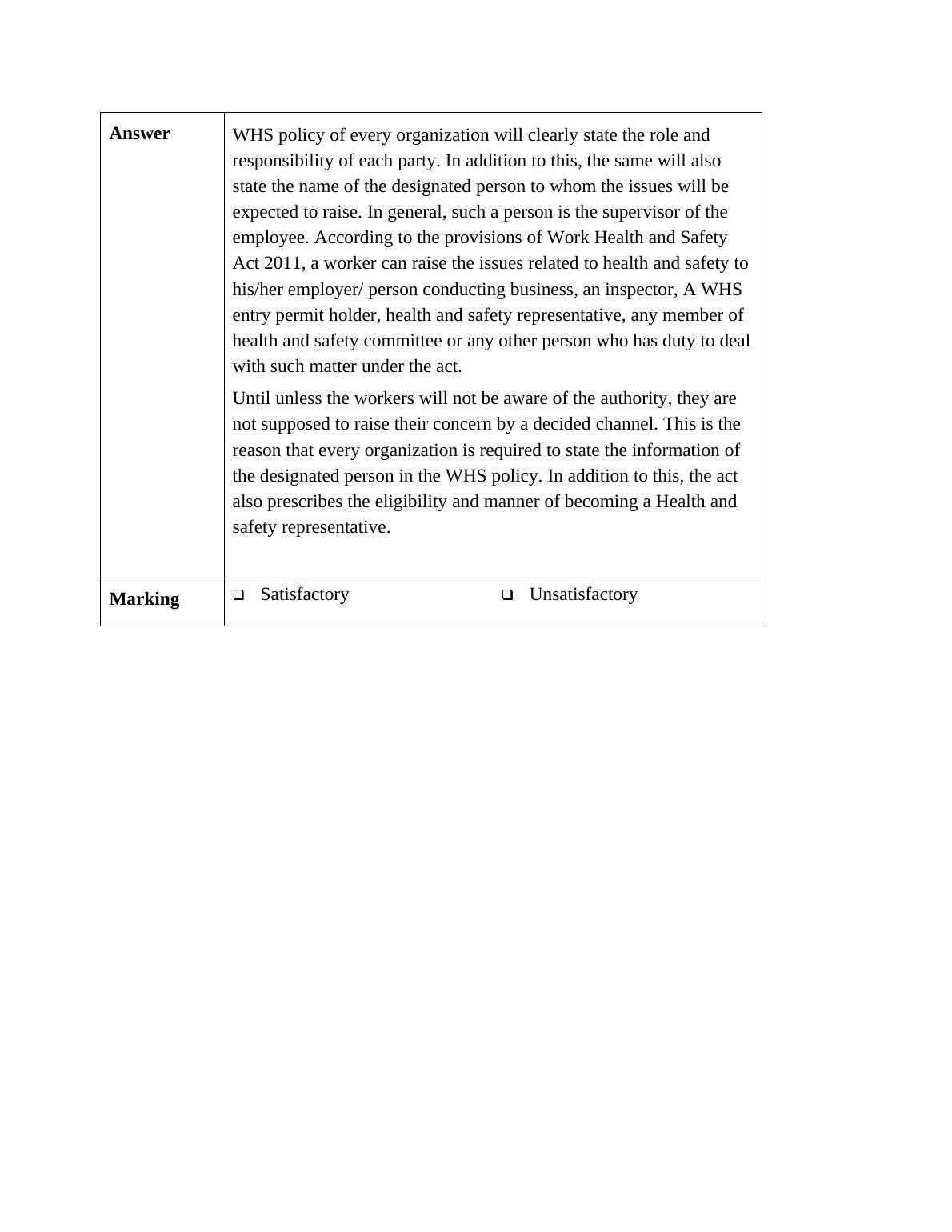
End of preview
Want to access all the pages? Upload your documents or become a member.
Related Documents
State/Territory Legislation Impact on Workplace Regulations and WHS Authoritieslg...
|24
|6648
|237
Healthcare: Workplace Safety and Health Regulationslg...
|14
|3019
|37
(HLTWHS004)-Manage Work Health and Safety: Impact of State Legislation and Regulationslg...
|15
|3073
|319
Appropriateness of WHS Management System to the Companylg...
|7
|1705
|276
Work Health and Safety Laws Doclg...
|9
|1551
|97
Work Safety in ICT Assignmentlg...
|14
|1018
|88
